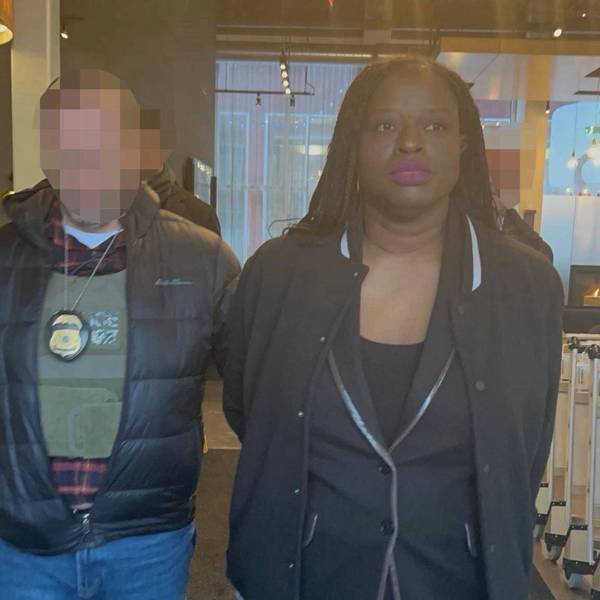There is something both sinister and cowardly about trying to destroy Black Jesus.
Black churches in North Carolina, Georgia, South Carolina, Florida, Ohio and Tennessee have burned in the weeks following the terrorist attack on Emanuel AME Church in Charleston, S.C. that killed 9 people. In response, agents of the state and mainstream media have attempted to gaslight black America into believing that the smoke choking our collective souls is imagined.
Lightning, that was it. Maybe some delinquent kid or faulty electrical wiring. According to the Department of Justice, "Preliminary investigations indicate that two of the fires were started by natural causes and one was the result of an electrical fire...If in fact there is evidence to support hate crime charges in any one of these cases, the FBI, in coordination with the ATF and local authorities, will work closely with the Civil Rights Division and the U.S. Attorneys' Offices to bring those forward."
Is it possible that these fires can be easily explained away by bad lightning or bad luck? Maybe. Is it likely? Absolutely not.
Unsurprisingly, even with America's long history of white supremacist violence against black homes and institutions -- particularly houses of worship - there has been more effort put into preemptively dousing black rage than into diffusing the coalesced white hatred that has risen to the forefront in the wake of Dylann Roof's attack on Mother Emanuel.
We've been here before -- right here. This is not an attack on Christianity; it is an attack on black America.
"We are familiar with the terror tactics of the KKK and other racists hate groups... These fascists, cowards have always targeted Black churches in the South," said Frank Chapman, Field Organizer of the Chicago Alliance Against Racist and Political Repression.
"That is why we don't believe these are just random acts of violence. These are deliberate acts of terrorism designed to cripple and destroy our movement...This is not a time for attacking the religious beliefs of the victims and survivors of racist terror. We must insist and demand that these racist-terrorists be brought to justice."
Chapman is spot-on in his assessment, even though his expectation of "justice" within the same racist framework we're trying to dismantle feels like a dream deferred. Justice in the United States has never been considered an inalienable right for black people, rather a privilege stingily and reluctantly handed out to the most "respectable" among us, if even then.
I am reminded of John Henrik Clarke, who wrote:
Who is justice? I would like to know,
Whosoever she is, I could love her so.
I could love her, though my race
So seldom looks upon her face.
This country's steep investment in white supremacy and white innocence underlines Clarke's words. With scarce details, a narrative has emerged in the wake of the church fires that seems relentlessly devoted to ensuring that each fire is viewed in a vacuum. After nearly a week of silence from mainstream media, the forced response seems to be, "There's nothing to see here, no connection to the mass murder in a Charleston and definitely not to each other."
Oh, but there is. Nothing could interest me less than cold theoretical musings on the history of church fires and the callous dismissal of black fear as its flung against a wall of apathy and tepid concern. And though forgiveness of the heinous acts committed against black folks has been positioned as next to godliness, if our blackness is really sacred, then our rage in response to attempts at its annihilation must be divine.
Let's be clear: If these were white Christian churches being burned to the ground in the wake of a terrorist attack acted out by an Islamic extremist, there would be a national outcry. The terror-alert signals favored by former President George W. Bush post 9/11 would be on red.
If there were nine dead white people to bury, one being a state senator, who were murdered during their prayer meeting by a black man, no black person in America would be safe.
Dylann Roof put bullet-holes through the faith of Mother Emanuel AME Church and whoever is burning black churches is attempting to burn that faith to the ground. These fires -- and the willful minimization of them -- are messages intended to convey to black America that there is no sanctuary that can protect us. When Christianity was foisted onto the backs of enslaved Africans in the United States, it was never meant to empower us; we were never intended to replace our "masters" with God.
We were always expected to view them as one in the same. And when we don't, they will huff, and puff, and blow our houses down.
These fires -- and the flaccid response them -- prove beyond a reasonable doubt that black people in this country are under attack and white supremacy is under protection. We know this. And we cannot wait on mainstream media or government agencies to give us permission to call a thing a thing.
The only question now is: What are we going to do about it?



